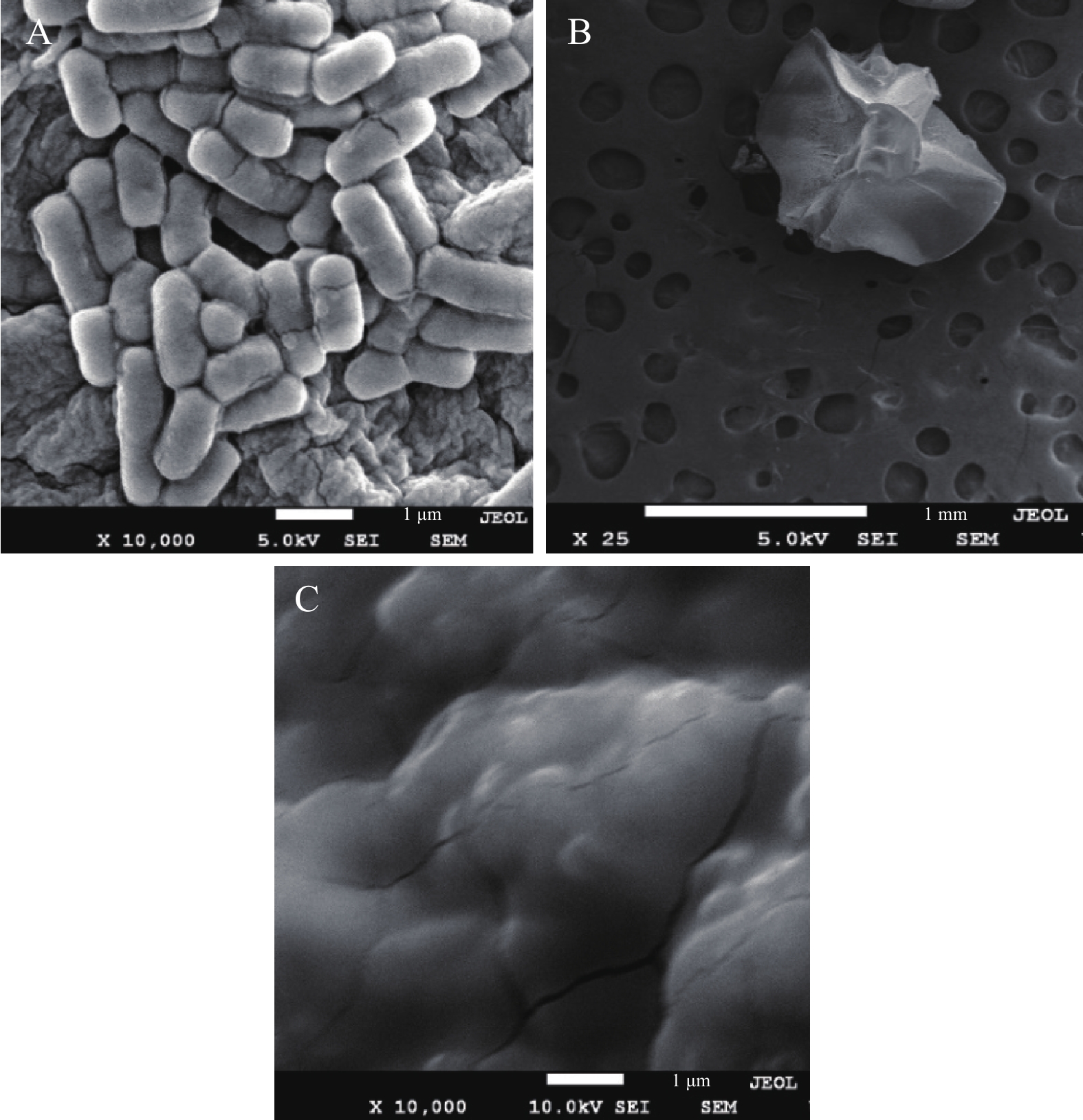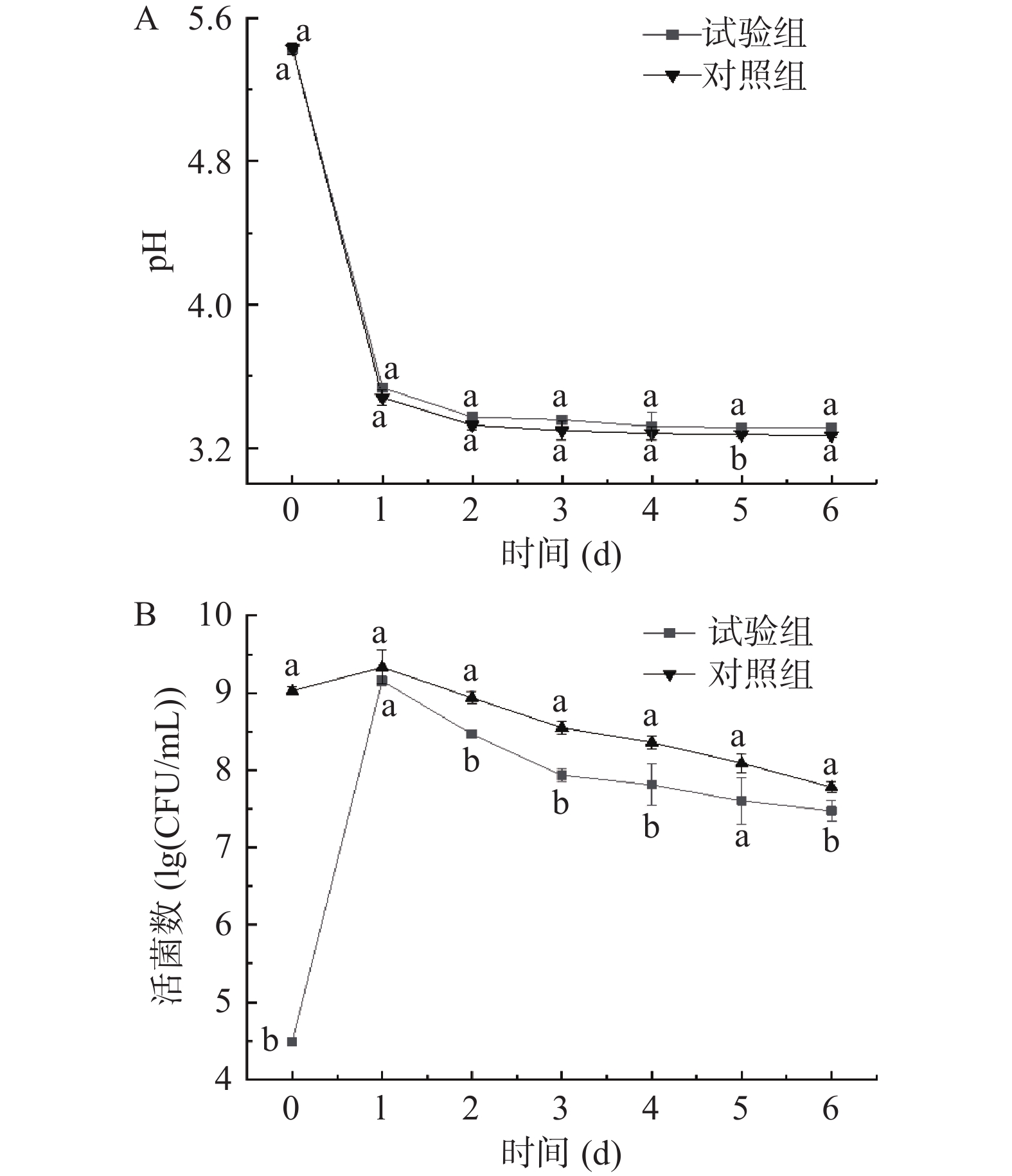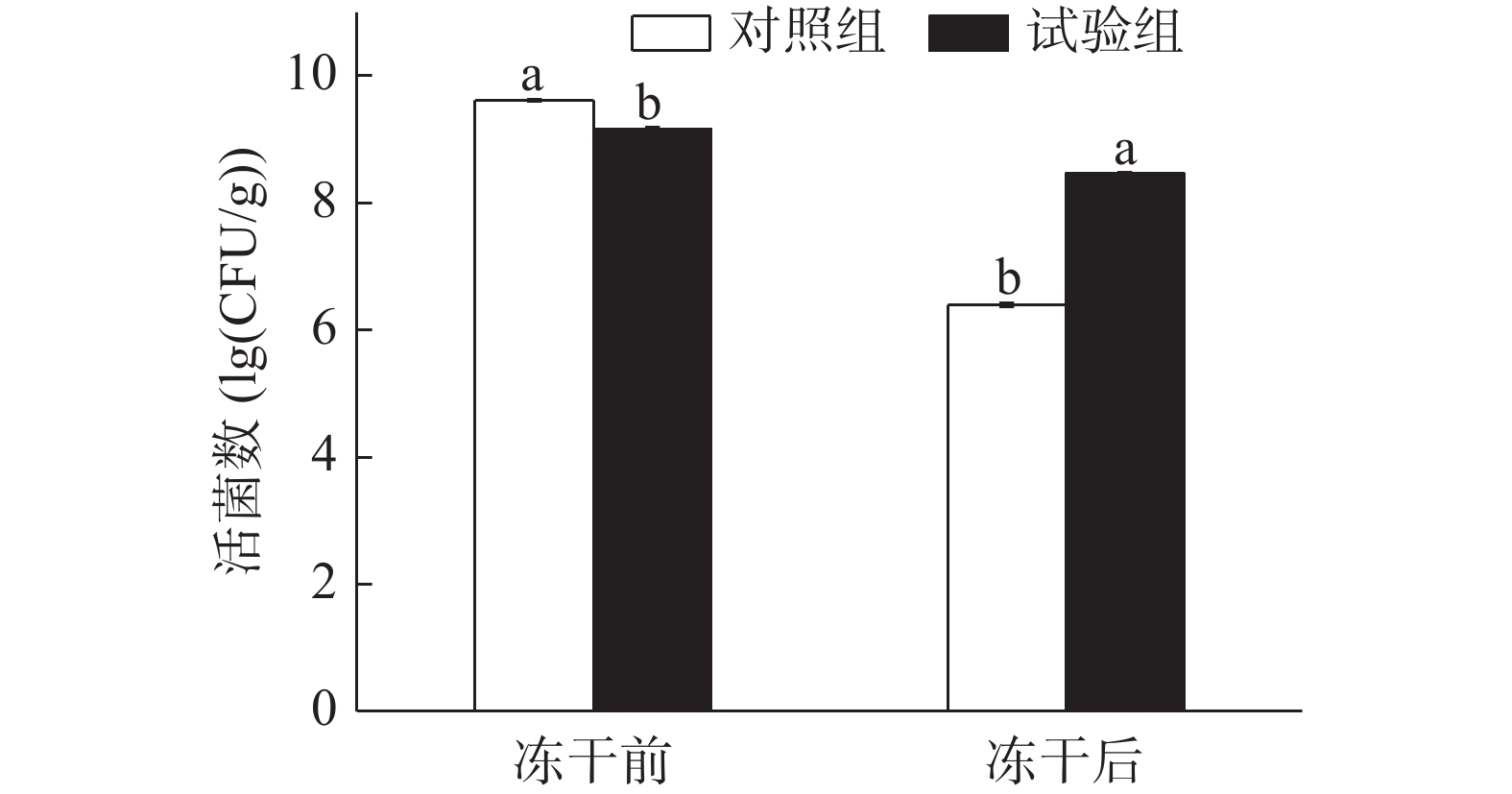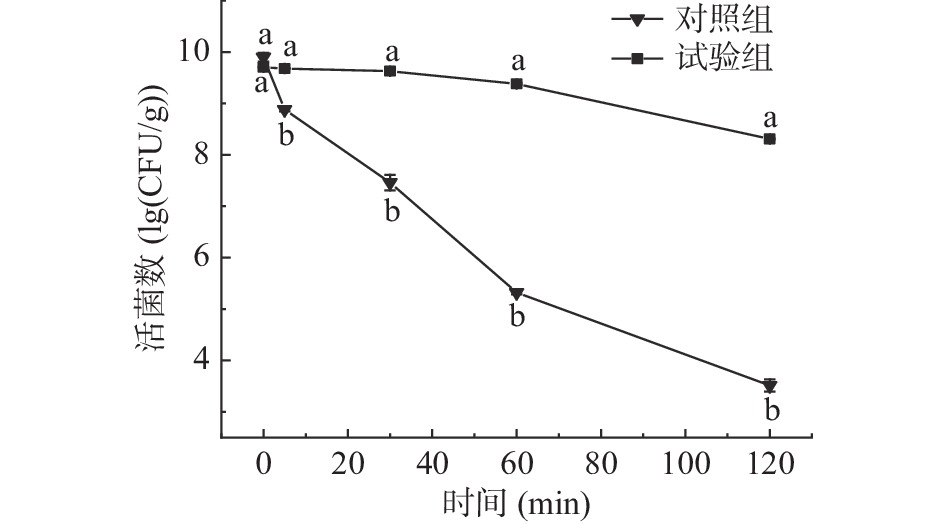Effects of Lactobacillus plantarum Microcapsules Fermentation on the Quality of Carrot Chips
-
摘要: 本研究以海藻酸钠和分离乳清蛋白为壁材,应用挤压法制备植物乳杆菌微胶囊。以植物乳杆菌微胶囊发酵的胡萝卜脆片为试验组,未经微胶囊处理发酵的胡萝卜脆片为对照组,探讨植物乳杆菌微胶囊发酵对胡萝卜脆片品质的影响及其在冷冻干燥和模拟胃液条件下活菌数的变化。结果表明:试验组和对照组的胡萝卜片在质构、色泽、总糖含量、胡萝卜素含量和抗坏血酸含量差异不显著(P>0.05)。在冷冻干燥和模拟胃液环境下,试验组的活菌数明显高于对照组,分别保持在(8.47±0.02)和(8.31±0.01) lg(CFU/g)。植物乳杆菌微胶囊发酵对胡萝卜脆片的品质没有产生显著影响,但可以提高植物乳杆菌对不良环境(如冷冻干燥和胃液)的抗性。Abstract: This paper aimed to explore the effect of Lactobacillus plantarum microcapsules fermentation on the quality of carrot chips, and the change of viable cell count under freeze-drying and simulated gastric juice conditions. In this study, Lactobacillus plantarum microcapsules were prepared by extrusion method using sodium alginate and isolated whey protein as wall materials. The carrot chips fermented with Lactobacillus plantarum microcapsules were used as experimental group and the carrot chips fermented without microcapsules were used as control group. The results showed that there were no significant differences in texture, color, total sugar content, carotene content and ascorbic acid content between test group and control group (P>0.05). In freeze-drying and simulated gastric juice environment, the number of viable bacteria in the test group was significantly higher than that in the control group, which remained (8.47±0.02) and (8.31±0.01) lg(CFU/g), respectively. Microencapsulated Lactobacillus plantarum fermentation had no prominent effect on the quality of carrot chips and could improve the resistance of Lactobacillus plantarum to adverse environments (such as freeze-drying and gastric juice).
-
Keywords:
- Lactobacillus plantarum /
- microcapsules /
- fermentation carrot /
- viable count /
- quality change
-
富含益生菌的食品已成为众多消费者的选择,益生菌作为发酵剂或者功能性成分被广泛应用到酸奶[1]、奶酪[2]、冰淇淋[3]和益生菌粉[4]等产品中。由于素食主义兴起以及对乳制品引起过敏的担忧,非乳制品消费者对益生菌的需求也在不断增加。被赋予“健康食品”美誉的水果和蔬菜[5],已被证实是一种新型益生菌生长的适宜载体[6]。
近年来,蔬果脆片逐渐占据市场,成为广大消费人群所追捧的休闲食品。胡萝卜具有很高的营养价值,富含类胡萝卜素、维生素、多酚、微量元素等多种生物活性物质[7]。前期研究表明,添加红枣汁和植物乳杆菌复合发酵胡萝卜,可以提高胡萝卜的营养价值,又可以掩盖胡萝卜原有的药腥味,散发出果蔬发酵独有的风味[8]。所以,可以通过发酵将益生菌富集到果蔬片上,再联合真空冷冻干燥技术[9]制备果蔬脆片。但是富含益生菌的食品由于菌株的特殊性,在生产、包装和运输中会发生益生菌数量锐减,导致益生菌食品向更广泛的消费者推广受到阻碍。
益生菌胶囊化技术作为一种提高益生菌在产品中生存能力的有效方法,已被开发并应用于功能食品中[10]。海藻酸钠和乳清分离蛋白作为复合壁材包埋益生菌,既具有抵抗外界压力的能力[11-13],又可以提高包埋率[14-15],保证益生菌能够抵抗胃肠消化等恶劣的环境条件。Massounga等[16]的研究表明,经乳清分离蛋白-低聚果糖复合物为壁材包埋益生菌的冻干香蕉粉在不利条件及长时间贮存时,可保持较高的菌活力和较好的贮藏稳定性。王婷婷[17]探讨了以海藻酸钠和浓缩乳清蛋白包埋益生菌制备的微胶囊在乳清发酵中的活菌数和pH变化,证明其在实际应用中不受限制可以完全释放。María等[18]以含低聚果糖的甲基纤维素膜包埋植物乳杆菌应用于苹果片,不仅可以提高苹果片的活菌数还可以保持其原有的品质。Altamirano-Fortoul等[19]以淀粉对嗜酸乳杆菌进行微囊化,通过可食用的涂层将其固定到面包表面,制作出的功能性面包除具有与普通面包相似的特性,还具有一定的健康益处。
为制备一款风味良好,富含益生菌的胡萝卜脆片,本研究通过发酵改善胡萝卜的风味,又引入微胶囊技术提高活菌数。探讨了植物乳杆菌微胶囊发酵对胡萝卜脆片品质的影响,及其在冷冻干燥以及模拟胃液中活菌数的变化,以期为益生菌微胶囊在食品领域中的应用提供一定技术参考。
1. 材料与方法
1.1 材料与仪器
胡萝卜 市售;红枣品种:“灰枣” 好想你健康食品股份有限公司;植物乳杆菌(Lactobacillus plantarum;L. plantarum)(CICC.20022) 中国工业微生物菌种保藏管理中心;海藻酸钠 临夏州华安生物制品有限责任公司;分离乳清蛋白 浙江一诺生物科技有限公司;MRS琼脂培养基、MRS肉汤培养基 北京奥博星生物技术有限责任公司;红菲咯啉(BP) 上海晶纯生化科技股份有限公司;氢氧化钠、三氯乙酸(TCA)、三氯化铁 天津大茂化学试剂厂;无水乙醇、磷酸、石油醚 天津市富宇精细化工有限公司;浓硫酸 洛阳昊华化学试剂有限公司;葡萄糖、抗坏血酸 天津市瑞金特化学品有限公司。
SW-CJ-IBV型超净工作台 上海浦东荣丰科学仪器有限公司;SC-80C型全自动色彩色差计 北京康光光学仪器有限公司;FE28型pH计、AL204型电子天平 瑞士梅特勒-托利多仪器有限公司;BC/BD-429H型冰柜 青岛海尔股份有限公司;HC-3618R型高速冷冻离心机 安徽中科中佳科学仪器有限公司;XY-FD-18冷冻干燥机 上海欣谕仪器有限公司;BPH-9272型精密恒温培养箱 上海一恒科学仪器有限公司;78-2双向磁力加热搅拌器 常州国华电器有限公司;HH-S4型恒温水浴锅 金坛市医疗仪器厂;LDZX-50KBS型立式压力蒸汽灭菌器 上海申安医疗器械厂;TU-1810紫外-可见分光光度计 北京普析通用仪器有限责任公司;TA-XT Plus型物性分析仪 英国Stable Micro Systems公司;JSM-7001F场发射扫描电子显微镜 日本电子株式会社。
1.2 实验方法
1.2.1 菌株活化
植物乳杆菌冻干粉接种到灭菌后的MRS液体培养基中,在37 ℃恒温培养箱活化培养48 h,连续扩大培养2次,将所得菌液离心(4 ℃,5000 r/min,10 min),倒掉上层培养基,用无菌水将沉淀洗2~3次后得到菌泥,再将其转入无菌水中振荡均匀,菌悬液活菌数达到(9.0±0.05) lg (CFU/mL),备用。
1.2.2 植物乳杆菌微胶囊的制备与表征
1.2.2.1 植物乳杆菌微胶囊的制备
称取一定质量的海藻酸钠粉末溶于无菌水中,70 ℃下水浴加热过夜至粉末充分溶解,制得质量分数为2%的海藻酸钠溶液,冷却备用。称取一定质量的乳清分离蛋白粉末溶于无菌水中,在磁力搅拌器上搅拌直至溶解完全,制得质量分数为2%的乳清分离蛋白溶液。称取一定质量的氯化钙颗粒溶于纯净水,121 ℃高压灭菌15 min,制得质量分数为2%氯化钙溶液。
采用挤压法制备微胶囊[20]:将2 mL菌悬液与2.5 mL乳清分离蛋白溶液混合,之后加入到2.5 mL海藻酸钠溶液中搅拌水合1 h。使用注射器将混合液挤压滴入100 mL氯化钙溶液中,形成微胶囊,磁力搅拌器搅拌30 min,使微囊充分凝固,用蒸馏水冲洗3次,除去多余的钙离子和未被包埋的益生菌,即得湿胶囊。
1.2.2.2 微胶囊包埋率的测定
包埋率的测定参照Darjani等[21]的方法略有改动。称取湿微胶囊样品1 g精确到0.10,加入9 mL柠檬酸钠(0.06 mol/L)和碳酸氢钠(0.20 mol/L)混合液中,涡旋振荡10 min使得胶粒溶解,乳酸菌完全释放。将混合液梯度稀释后涂布于MRS琼脂上,37 ℃厌氧培养48 h并计数。微胶囊的包埋率按照下式计算:
包埋率(%)=lgNlgN0×100 式中:N为包埋后胶粒释放的活菌数量,CFU/g;N0为包埋前溶液活菌数量,CFU/g。
1.2.2.3 微胶囊的形态观察
参考陈秉彦等[22]的方法以场发射扫描电子显微镜观察冻干微胶囊的整体形态及微观结构。
1.2.3 胡萝卜片的制备
胡萝卜清洗,切成厚度为0.4 cm的扇形,90 ℃热烫15 s,捞出沥水后,备用。红枣清洗、去核,按照料液比1:8(g/mL)进行打浆,双层纱布过滤3次得到枣汁,调整枣汁的糖度为10%(w/v),盐1%(w/v),80 ℃下灭菌30 min,冷却,备用。
对照组:将1.2.1的菌悬液以4% (w/v)接入枣汁,再以1:1(w/v)的比例加入处理好的胡萝卜片,在37 ℃条件下发酵6 d后于−20 ℃预冻8 h,真空冷冻干燥14 h。
试验组:取与对照组相同接种量的菌悬液,以1.2.2的方法制成微胶囊接入枣汁,以1:1(w/v)的比例加入处理好的胡萝卜片,在37 ℃条件下发酵6 d后于−20 ℃预冻8 h,真空冷冻干燥14 h。
1.2.4 微胶囊发酵胡萝卜过程中指标的测定
1.2.4.1 pH的测定
采用pH计,每天取50 mL发酵液,进行测定。
1.2.4.2 活菌数的测定
每天取发酵液1 mL,以稀释平板涂布法进行计数。
1.2.5 胡萝卜脆片指标的检测
1.2.5.1 质构的测定
采用物性分析仪,参照李瑞杰[23]的方法测定胡萝卜干燥后的硬度和脆度。采用P 0.5探头,TPA模式,测前速度(pre-test speed)为5 mm/s,测试速度(test speed)为2 mm/s,测后速度(post-test speed)为5 mm/s,触发力(target force)为20 g,压缩距离(distance)为3 mm。每种处理样品重复做五次,取其平均值。
1.2.5.2 色差的测定
采用全自动色彩色差计测定胡萝卜片的明亮度(L*值)和绿/黄值(a*正值表示红色,a*负值表示绿色;b*正值表示黄色,b*负值表示蓝色)。取胡萝卜片的外围部分进行测量。
1.2.5.3 多糖含量的测定
参照SN/T 4260-2015《出口植物源食品中粗多糖的测定苯酚-硫酸法》[24]的方法,测定胡萝卜多糖含量,单位以(g/100 g)表示。
1.2.5.4 胡萝卜素含量的测定
采用周新丽等[25]的方法稍加修改,测定胡萝卜素含量,单位为(mg/100 g)。
1.2.5.5 抗坏血酸含量的测定
采用分光光度计法[26],测定抗坏血酸含量,单位为(mg/100 g)。
1.2.5.6 真空冷冻干燥后活菌数的测定
参照于红等[27]的方法,分别取对照组和试验组的胡萝卜片,以料液比1:10接入无菌生理盐水中,37 ℃,50 r/min振荡2 h后对真空冷冻干燥后的活菌数计数。
1.2.5.7 模拟胃液消化后活菌数的测定
采用常柳依等[28]的方法,配制模拟胃液:用浓盐酸将2 mg/mL NaCl溶液的pH调至2.0,再加入胃蛋白酶并使最终质量浓度达到0.3 g/L,121 ℃灭菌15 min。
分别取对照组和试验组的胡萝卜片以料液比1:10接入模拟胃液溶液,涡旋30 s完全分散。在37 ℃,50 r/min摇床培养2 h。分别在5、30、60、120 min取1 mL样品溶液进行计数。
1.2.5.8 植物乳杆菌活菌数的计数
计数方法参考GB 4789.35-2016《食品安全国家标准食品微生物学检验乳酸菌检验》[29]。
1.3 数据处理
所有独立试验至少重复3次,试验数值以平均数±标准差表示。应用SPSS23.0统计软件对各试验数据进行方差分析和显著性检验,Origin 8.5软件制图。
2. 结果与分析
2.1 微胶囊的包埋率及形态观察
由表1可知,SA-WPI微胶囊的包埋率为70.40%±2.80%,活菌数为(9.47±0.02) lg (CFU/g)。细菌细胞的表面主要由糖蛋白组成,糖蛋白可以与壁材建立相互作用。蛋白质与碳水化合物的混合物通过静电吸引、氢键和范德华力结合,具有补充的包埋作用[30]。
表 1 微胶囊的包埋率及活菌数Table 1. Encapsulation yield and viable bacteria count of microcapsules项目 包埋率(%) 活菌数(lg (CFU/g)) 植物乳杆菌微胶囊 70.40±2.80 9.47±0.02 植物乳杆菌的形态如图1A,呈现乳酸菌典型的棒状形态,菌体表面平整,大小约为1.00 μm×0.50 μm。微胶囊的形态如图1B,在25倍的镜头下可以看到微胶囊的粒径大小约1 mm。放大到10000倍时如图1C,表面光滑而且裂纹浅,呈现出致密的表面形态,植物乳杆菌基本全被包埋于内部。这可能是由于乳清蛋白-Ca2+交联海藻酸盐,微胶囊更加紧凑,以防止芯材的变质或丢失,有利于无任何裂纹的光滑表面的形成[31]。
2.2 植物乳杆菌微胶囊发酵胡萝卜pH和活菌数的变化
由图2A可知,发酵过程中试验组和对照组的pH变化趋势相同,在发酵第1 d时pH都快速下降,2~6 d的降低速度减缓,pH的变化比较慢。发酵第6 d的pH分别降到3.27和3.31。图2B是试验组和对照组的胡萝卜发酵6 d的活菌数变化,两组的活菌数在0~6 d变化趋势都是先增加后减少。试验组由于微胶囊化对植物乳杆菌的限制,发酵过程中活菌数低于对照组。结合pH的变化,微胶囊化的植物乳杆菌虽然释放速度慢,但是并不影响发酵进程。
2.3 植物乳杆菌微胶囊发酵对胡萝脆卜片品质的影响
由表2可知,与未发酵的胡萝卜片相比,对照组和试验组的胡萝卜脆片的硬度下降,脆度无明显变化,这可能是微生物活动引起的变化,与张丽华等[8]的研究结果一致。方差分析表明对照组和试验组的胡萝卜在硬度和脆度上无显著性差异(P>0.05)。相较于未发酵的脆片,对照组和试验组的胡萝卜片的亮度(L*)升高,这可能与发酵过程中水分变化有关[32],红色值a*升高,黄色值b*比较稳定,变化不显著(P>0.05)。方差分析结果表示,试验组和对照组的胡萝卜色泽差异不显著(P>0.05)。所以,微胶囊化和未微囊胶化的植物乳杆菌发酵对胡萝卜片的硬度、脆度和色泽影响不显著(P>0.05)。
表 2 植物乳杆菌微胶囊对胡萝卜脆片品质的影响Table 2. Effects of Lactobacillus plantarum microcapsules on the quality of carrot chips指标 未发酵胡萝卜脆片 对照组 试验组 硬度(g) 31649.82±3505.34a 23138.77±3757.54b 20325.56±3510.08b 脆度(g) 8163.08±1570.75a 8795.02±1325.23a 8618.74±2040.53a L* 73.82±3.18a 75.73±1.10b 75.31±0.25b a* 29.33±3.65a 33.11±0.67b 33.57±0.55b b* 39.24±2.34a 41.65±2.02a 42.17±1.48a 多糖含量(g/100 g) 0.89±0.24a 0.45±0.06b 0.47±0.07b 胡萝卜素含量(mg/100 g) 20.12±0.16a 17.06±1.10b 17.13±0.04b 抗坏血酸含量(mg/100 g) 8.60±0.38a 8.34±0.32a 8.31±0.25a 注:同行不同小写字母表示试验组和对照组差异显著(P<0.05)。 由表2可知,相较于未发酵的脆片,对照组和试验组的胡萝卜片由于植物乳杆菌对多糖的分解,胡萝卜多糖含量显著降低(P<0.05)。胡萝卜素含量明显降低,可能与微生物本身代谢有关以及环境因素的影响而发生降解[33]。抗坏血酸含量没有显著变化(P>0.05),可能是乳酸发酵过程产生的酸性环境和CO2 造成的缺氧环境有利于胡萝卜中抗坏血酸的保存[34]。方差分析结果表明,对照组和试验组多糖、胡萝卜素和抗坏血酸含量的变化差异不显著(P>0.05)。植物乳杆菌胶囊化不会对胡萝卜片的品质产生影响。
2.4 微囊化植物乳杆菌在真空冷冻干燥中活菌数的变化
如图3所示,真空冷冻干燥前由于微胶囊化的限制,对照组胡萝卜的活菌数比试验组高0.45 lg (CFU/g)。冷冻干燥后试验组的活菌数显著高于对照组(P<0.05),活菌数分别为(8.47±0.02)和(6.40±0.03) lg(CFU/g)。微胶囊化植物乳杆菌可有效保护冷冻干燥对菌体造成的损伤,一方面可能是包埋壁材在植物乳杆菌周围形成粘性层,抑制冰晶生长。另一方面胶囊的微环境延迟了菌体的再水合作用,可能会对细胞的渗透性休克产生保护作用[35],从而提高植物乳杆菌在冻干过程中的活菌数。
2.5 微囊化植物乳杆菌在模拟胃液中活菌数的变化
由图4可知,对照组和试验组的活菌数在体外模拟胃液处理的120 min内连续降低。对照组在胃酸的作用下,活菌数快速下降,处理120 min后活菌数为(3.51±0.11) lg(CFU/g)。这是因为植物乳杆菌在低pH条件下,其细胞膜跨膜运输不能正常进行从而导致其死亡[36]。试验组的植物乳杆菌具有较高的细胞活力,120 min后细胞活力保持在(8.31±0.01) lg(CFU/g)。这与Han等[37]的研究结果基本一致,可能是微胶囊在植物乳杆菌和外界环境之间形成物理屏障,减少酸的渗入有效缓解了对菌体细胞的损伤。
3. 结论
由试验组与对照组的比较可知,微胶囊化的植物乳杆菌虽然释放速度慢,但是并不影响发酵进程。而且,与对照组相比,植物乳杆菌微胶囊发酵对胡萝卜脆片的质构、色泽、多糖含量、胡萝卜素含量和抗坏血酸含量没有显著影响。但是,植物乳杆菌微囊化可以显著提高益生菌在冷冻干燥和模拟胃液中的活菌数,分别保持在(8.47±0.02)和(8.31±0.01) lg(CFU/g)。基于上述,微胶囊技术可以明显提升益生菌对不良环境(如低温、胃液)的抗性,因而可以在保证胡萝卜片良好品质特性的同时,提高益生胡萝卜片的功能潜力,具有一定的应用前景。
-
表 1 微胶囊的包埋率及活菌数
Table 1 Encapsulation yield and viable bacteria count of microcapsules
项目 包埋率(%) 活菌数(lg (CFU/g)) 植物乳杆菌微胶囊 70.40±2.80 9.47±0.02 表 2 植物乳杆菌微胶囊对胡萝卜脆片品质的影响
Table 2 Effects of Lactobacillus plantarum microcapsules on the quality of carrot chips
指标 未发酵胡萝卜脆片 对照组 试验组 硬度(g) 31649.82±3505.34a 23138.77±3757.54b 20325.56±3510.08b 脆度(g) 8163.08±1570.75a 8795.02±1325.23a 8618.74±2040.53a L* 73.82±3.18a 75.73±1.10b 75.31±0.25b a* 29.33±3.65a 33.11±0.67b 33.57±0.55b b* 39.24±2.34a 41.65±2.02a 42.17±1.48a 多糖含量(g/100 g) 0.89±0.24a 0.45±0.06b 0.47±0.07b 胡萝卜素含量(mg/100 g) 20.12±0.16a 17.06±1.10b 17.13±0.04b 抗坏血酸含量(mg/100 g) 8.60±0.38a 8.34±0.32a 8.31±0.25a 注:同行不同小写字母表示试验组和对照组差异显著(P<0.05)。 -
[1] 郑佳. 降胆固醇益生菌发酵酸奶及其延长保质期的研究[D]. 贵阳: 贵州大学, 2019: 25−37. ZHEN J. Study on cholesterol-lowering probiotics fermented yoghurt and its prolonging shelf life[D]. Guiyang: Guizhou University, 2019: 25−37.
[2] 郭琳仪. 复配益生菌及工艺条件对羊乳软质奶酪品质影响研究[D]. 杨凌: 西北农林科技大学, 2019: 10−18. GUO L Y. Research on the effect of compound probiotics and technological conditions on the quality of soft goat cheese[D]. Yangling: Northwest A&F University, 2019: 10−18.
[3] 田文静, 赵东瑞, 孙玉清, 等. 微胶囊技术在益生菌CICC 6075冰淇淋中的应用[J]. 食品工业科技,2020,41(21):67−74. [TIAN W J, ZHAO D R, SUN Y Q, et al. Application of microencapsulation technology in probiotic ice cream with CICC 6075[J]. Science and Technology of Food Industry,2020,41(21):67−74. [4] 贾宏信. 益生菌乳粉贮存过程中水分、水分活度及活菌数变化的研究[J]. 食品工业,2018,39(7):194−197. [JIA H X. Changes of moisture content, water activity and viable cells of probiotics milk powder during storage[J]. The Food Industry,2018,39(7):194−197. [5] KEVIN H S. Considerations for the successful development and launch of personalised nutrigenomic foods[J]. Mutation Research-Fundamental and Molecular Mechanisms of Mutagenesis,2007,622(1):117−121.
[6] PATEL A R. Probiotic fruit and vegetable juices- recent advances and future perspective[J]. International Food Research Journal,2017,24(5):1850−1857.
[7] 余熠杨, 邓源喜, 徐情, 等. 胡萝卜的营养保健功能及其开发应用进展[J]. 安徽农学通报,2020,26(17):129−131. [YU Y Y, DENG Y X, XU Q, et al. Advancement of health function of carrot and its utilization[J]. Anhui Agricultural Science Bulletin,2020,26(17):129−131. doi: 10.3969/j.issn.1007-7731.2020.17.057 [8] 张丽华, 王霞, 赵光远, 等. 添加红枣汁对植物乳杆菌发酵胡萝卜品质的影响[J]. 食品工业科技,2020,41(15):99−105. [ZHANG L H, WANG X, ZHAO G Y, et al. Effects of adding jujube juice on quality of carrot fermented by Lactobacillus plantarum[J]. Science and Technology of Food Industry,2020,41(15):99−105. [9] 高雅, 官孝瑶, 黄嘉文, 等. 真空冷冻干燥技术在功能性食品中的应用研究[J]. 现代食品,2018(22):5−7. [GAO Y, GUAN X Y, HUANG J W, et al. Application research of vacuum freeze-drying technology in functional foods[J]. Modern Food,2018(22):5−7. [10] COGHETTO C C, HICKMAN FLORES S, GRAZIELA B B, et al. Viability and alternative uses of a dried powder, microencapsulated Lactobacillus plantarum without the use of cold chain or dairy products[J]. LWT-Food Science and Technology,2016,71:54−59. doi: 10.1016/j.lwt.2016.03.020
[11] ZHANG B B, WANG L, CHARLES V, et al. Robust and biocompatible hybrid matrix with controllable permeability for microalgae encapsulation[J]. ACS Applied Materials & Interfaces,2016,8(14):8939−8946.
[12] SUVARNA S, DSOUZA J, RAGAVAN M L, et al. Potential probiotic characterization and effect of encapsulation of probiotic yeast strains on survival in simulated gastrointestinal tract condition[J]. Food Science and Biotechnology,2018,27(3):745−753. doi: 10.1007/s10068-018-0310-8
[13] RAHMATI F. Microencapsulation of Lactobacillus acidophilus and Lactobacillus plantarum in eudragit S100 and alginate chitosan under gastrointestinal and normal conditions[J]. Applied Nanoscience,2020,10(1):391−399.
[14] RABIA I, TAHIR Z, NUZHAT H, et al. In-vitro GIT tolerance of microencapsulated Bifidobacterium bifidum ATCC 35914 using polysaccharide-protein matrix[J]. Probiotics and Antimicrobial Proteins,2019,11(3):830−839. doi: 10.1007/s12602-017-9384-5
[15] 孙亚利, 周文美, 黄永光, 等. 以聚合乳清蛋白为壁材的苦荞黄酮微胶囊化及其品质分析[J]. 食品科学,2020,41(12):259−266. [SUN Y L, ZHOU W M, HUANG Y G, et al. Microencapsulation and quality analysis of tartary buckwheat flavonoids using polywhey protein as wall material[J]. Food Science,2020,41(12):259−266. doi: 10.7506/spkx1002-6630-20190624-291 [16] MASSOUNGA B A, 李晓东, 杜玲玲, 等. 微胶囊化干酪乳杆菌和嗜酸乳杆菌在冻干香蕉粉中的活力研究[J]. 中国食品学报,2017,17(9):33−40. [MASSOUNGA B A, LI X D, DU L L, et al. Study on the viability of L. acidophilus and L. casei microencapsulated in freeze-dried banana powder[J]. Journal of Chinese Institute of Food Science and Technology,2017,17(9):33−40. [17] 王婷婷. 内源乳化法制备干酪乳杆菌微胶囊及其在乳清发酵中应用[D]. 哈尔滨: 东北农业大学, 2016: 28−34. WANG T T. Preparation of Lactobacillus casei microcapsule by endogenous emulsion and its fermentation application in the whey[D]. Harbin: Northeast Agricultural University, 2016: 28−34.
[18] MARÍA JOSÉ T Q, NELSON R, PABLO M, et al. Green apple baked snacks functionalized with edible coatings of methylcellulose containing Lactobacillus plantarum[J]. Journal of Functional Foods,2015,16:164−173. doi: 10.1016/j.jff.2015.04.024
[19] ALTAMIRANO FORTOUL R, MORENO TERRAZAS R, QUEZADA GALLO A, et al. Viability of some probiotic coatings in bread and its effect on the crust mechanical properties[J]. Food Hydrocolloids,2012,29(1):166−174. doi: 10.1016/j.foodhyd.2012.02.015
[20] 赵伟丽, 李晓东, 李东花, 等. 微胶囊化对植物乳杆菌在高盐干酪中存活率的影响[J]. 中国食品学报,2018,18(5):98−105. [ZHAO W L, LI X D, LI D H, et al. Effect of microencapsulation on the survival rate of Lactobacillus plantarum in high-salt cheese[J]. Journal of Chinese Institute of Food Science and Technology,2018,18(5):98−105. [21] DARJANI P, NEZHAD M H, KADKHODAEE R, et al. Influence of prebiotic and coating materials on morphology and survival of a probiotic strain of Lactobacillus casei exposed to simulated gastrointestinal conditions[J]. LWT,2016,73:162−167. doi: 10.1016/j.lwt.2016.05.032
[22] 陈秉彦, 林晓姿, 李维新, 等. 海藻酸钠-纳米纤维素胶粒对乳酸菌胃肠液耐受性的影响[J]. 食品科学,2021,42(3):179−185. [CHEN B Y, LIN X Z, LI W X, et al. Effects of sodium alginate-nanocellulose beads on the viability of lactic acid bacteria in simulated gastrointestinal fluid[J]. Food Science,2021,42(3):179−185. doi: 10.7506/spkx1002-6630-20200214-141 [23] 李瑞杰. 休闲型脱水果蔬的联合干燥工艺研究[D]. 无锡: 江南大学, 2008: 17−18. LI R J. Study on the combined drying process of leisure dehydrated fruits and vegetables [D]. Wuxi: Jiangnan university, 2008: 17−18.
[24] 李彦伟. 超高压提取黄精多糖工艺优化、结构分析及抗氧化性研究[D]. 大连: 大连理工大学, 2019: 12−15. LI Y W. Study on the process optimization, structure and antioxidant activity of polygonatum polysaccharides by ultra-high pressure extraction[D]. Dalian: Dalian University of Technology, 2019: 12−15.
[25] 周新丽, 申炳阳, 张三强, 等. 超声波辅助冷冻干燥对胡萝卜品质的影响[J]. 食品与发酵工业,2018,44(8):196−202. [ZHOU X L, SHEN B Y, ZHANG S Q, et al. Effect of ultrasonic assisted freeze drying on the quality of carrot[J]. Food and Fermentation Industries,2018,44(8):196−202. [26] 佘婷婷. 广州地区不同栽培方式对蔬菜品质影响的研究[D]. 广州: 暨南大学, 2015: 24-29. SHE T T. Effects of different cultivation methods on vegetable quality in Guangzhou[D]. Guangzhou: Jinan University, 2015: 24-29.
[27] 于红, 彭珍, 黄涛, 等. 高活性益生菌发酵枸杞粉的真空冷冻干燥工艺优化[J]. 食品科学,2019,40(20):255−260. [YU H, PENG Z, HUANG T, et al. Optimization of vacuum freeze drying for preparation of fermented goji berry (Lycium barbarum L. ) powder with probiotics[J]. Food Science,2019,40(20):255−260. doi: 10.7506/spkx1002-6630-20181022-243 [28] 常柳依, 庄晶云, 孟菲, 等. 海洋寡糖益生菌微胶囊的制备和体外评估及其对动物肠道菌群的调节作用[J]. 食品科学,2019,40(24):142−150. [CHANG L Y, ZHUANG J Y, MENG F, et al. Preparation and in vitro evaluation of marine oligosaccharide coated microcapsules containing probiotics and their regulatory effect on animal intestinal flora[J]. Food Science,2019,40(24):142−150. doi: 10.7506/spkx1002-6630-20181127-311 [29] 国家食品药品监督管理总局, 国家卫生和计划生育委员会. GB 4789.35-2016 食品安全国家标准食品微生物学检验乳酸菌检验[S]. 北京: 中国标准出版社, 2016. State Food and Drug Administration, National Health and Family Planning Commission. GB 4789.35-2016 The national standard for food safety, food microbiology, detection of lactic acid bacteria[S]. Beijing: Standards Press of China, 2016.
[30] VAZIRIA S, ALEMZADEH I, VOSSOUGHI M. Improving survivability of Lactobacillus plantarum in alginate-chitosan beads reinforced by Na-tripolyphosphate dual cross-linking[J]. LWT-Food Science and Technology,2018,97:440−447. doi: 10.1016/j.lwt.2018.07.037
[31] DEHKORDI S S, ALEMZADEH I, VAZIRI A, et al. Optimization of alginate-whey protein isolate microcapsules for survivability and release behavior of probiotic bacteria[J]. Applied Biochemistry and Biotechnology,2020,190(8):182−196.
[32] 王冉. 发酵方式对萝卜泡菜发酵过程中品质的影响[D]. 雅安: 四川农业大学, 2014: 29−36. WANG R. Effects of fermentation methods on the quality of pickled radish in the fermentation[D]. Ya'an: Sichuan Agricultural University, 2014: 29−36.
[33] 马彦彦. 益生发酵对胡萝卜粉品质的影响[D]. 泰安: 山东农业大学, 2020: 16-19, 40. MA Y Y. Effects of probiotic fermentation on the quality of carrot powder[D]. Tai 'an: Shandong Agricultural University, 2020: 16-19, 40.
[34] RAFFAELLA D C, ROSALINDA F S, ANNALISA P, et al. Effect of autochthonous lactic acid bacteria starters on health-promoting and sensory properties of tomato juices[J]. International Journal of Food Microbiology,2008,128(3):473−483.
[35] TONNIS W F, MENSINK M A, JAGER A D, et al. Size and molecular flexibility of sugars determine the storage stability of freeze-dried proteins[J]. Molecular Pharmaceutics,2015,12(3):684−694. doi: 10.1021/mp500423z
[36] KAILASAPATHY K. Survival of free and encapsulated probiotic bacteria and their effect on the sensory properties of yoghurt[J]. LWT-Food Science and Technology,2006,39(10):1221−1227. doi: 10.1016/j.lwt.2005.07.013
[37] HAN C L, XIAO Y J, LIU E C, et al. Preparation of Ca-alginate-whey protein isolate microcapsules for protection and delivery of L. bulgaricus and L. paracasei[J]. International Journal of Biological Macromolecules,2020,163:1361−1368. doi: 10.1016/j.ijbiomac.2020.07.247
-
期刊类型引用(2)
1. 居子瑄,瞿恒贤,钱易,李康宁,李文静,顾瑞霞. 添加Kefir对植物乳植杆菌发酵胡萝卜品质的影响. 食品科学. 2025(06): 108-115 .  百度学术
百度学术
2. 程荣,刘瑞玲,吴伟杰,陈慧芝,房祥军,陈杭君,牛犇,郜海燕. 电子鼻结合气相色谱-离子迁移谱法鉴别不同干燥方式的膳食虾肉复合果蔬棒风味变化. 食品安全质量检测学报. 2024(09): 187-196 .  百度学术
百度学术
其他类型引用(0)






 下载:
下载:




 下载:
下载:



